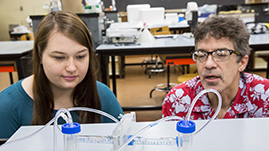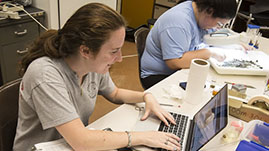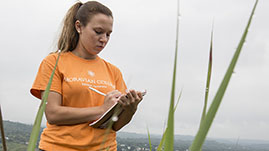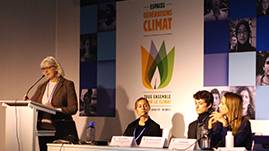Research
Carrying out original research is the root of all that flowers in biology.
Traditional classroom lecturing is a mainstay of education. And with good reason: it has served humans well for hundreds of years, and remains arguably the most effective way of conveying large amounts of information to many people simultaneously. But biology, like any science, is more than the simple (and complex) facts that can be transmitted this way. As Henri Poincaré observed, "Science is facts: just as houses are made of stones, so is science made of facts; but a pile of stones is not a house and a collection of facts is not necessarily science." Science is a uniquely human activity and must be experienced in order to be truly understood and mastered.
We are constantly looking for ways to incorporate more research experiences into our course labs and develop opportunities for Moravian students to engage in independent research. Developing research questions, devising experimental strategies to answer them, carrying out the necessary experiments at the bench or in the field, and confronting the inevitable obstacles that arise are all integral to becoming skilled biologists. The costs in time and material are significant, but the rewards are invaluable.
Student Research

Olfactory Learning and Memory of Bang-Sensitive Drosophila melanogaster
Natalie Herb '16 gathers information about mutant fruit flies that can be relevant to people that have epilepsy and other seizure disorders.

The Impact of Land Preservation on Water Quality in the Lehigh River
Shannon Bensetler '15 used both field and lab work to examine different sites on the Lehigh River watershed.

Succession Monitoring in Prescribed-burn and Control Plots at a Portion of the Restoration Area of the Palmerton Superfund Site
The Palmerton Superfund site, the largest contaminated site on the National Priorities List east of the Mississippi River, is being monitored for ongoing risks associated with the toxic heavy metals.
Faculty Research

United Nations Climate Change Conference
Diane Husic, accompanied by students and alumni, attended the UNFCCC in Paris. Follow the Moravian University blog from UNFCCC, selected among other top blogs by members of the Research and Independent NGOs and sent to over 500 research groups worldwide.

